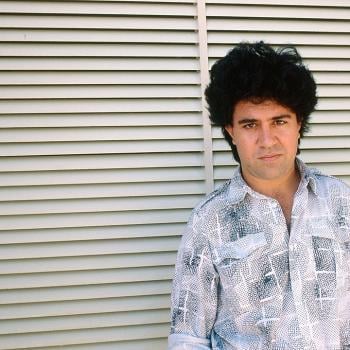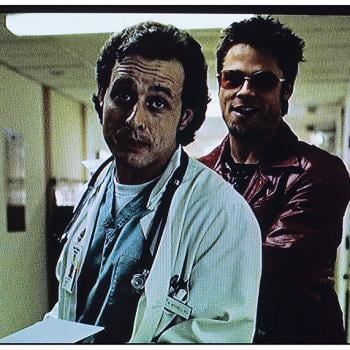
Source: Niko Vermeer via Wikimedia
License
I hesitate to say the “movies are back” because I think anyone paying sufficient attention knows cinema must change. There’s no going back to pre-COVID, pre-streaming. We can return to neither the New nor the Old Hollywood. No river stepped in at different times, etc. But I’m human, and I confess missing the mid-budget audience pleaser. Not everything needs to be Stan Brakhage or even Paul Thomas Anderson. Drop (2025) pretends to be nothing more than what it is: a date-night thriller.
Aside from being the son of Bonanza (1959-1973) star Michael Landon, director Christopher Landon earned his stripes as a genre hand, writing and directing films in the Paranormal Activity series (2007-2021). While that may sound like no vote of confidence, Landon succeeds here by keeping things simple and lean. Drop runs to barely 90 minutes. Longstanding formal issues like how to show text messages on screen pose no problem; he floats the words on the screen. The settings look only half-real (I’ll be amazed if that restaurant isn’t a set). Landon pulls out high-contrast lighting and slow pull-outs where necessary to heighten tension and suggest moods. It’s all by the book.
That goes double for the plot. Violet Gates (Meghann Fahy), a young widow and domestic abuse survivor, goes on a much-anticipated first date with an attractive photographer (Brandon Sklenar). She leaves her son at home with her sister and heads off to dinner. Unfortunately for her, someone who can clearly see and hear her uses digital drops to suggest that if she does not kill her date, her son will die. Drop tells the story of her navigating this impossible situation.
Implausible? Absolutely. But Landon extracts a variety of pleasures from Fahy’s misfortunes. I took satisfaction in watching her balance the romance of a first date gone well with the need to scheme behind his back. In those moments, I felt taken back to every time I’ve gotten some bad news I could not share while out in public. There’s a perverse joy in keeping a secret, even one you want to share. There’s a happiness to be drawn from overcoming these kinds of obstacles. At first, she is hopeless, silently begging bathroom bystanders for help. As her panic fades, Fahy’s character becomes an expert at managing her own emotions, turning on a dime from suave date who can talk all about her job as a therapist to a calculating schemer.
While the film mostly takes itself seriously, Landon sprinkles humor throughout, just enough to ensure that the premise’s implausibility does not matter. Jeffrey Self is marvelous as Matt, their annoying, improv-loving waiter whose constant annoyances always come at the worst time. When Fahy’s character screeches and smashes an SD card in the bathroom, a woman walks in and, like Grandpa Simpson headed into a burlesque house, enters only to swing her way right back out the door. Drop walks a fine line between necessary sincerity (why else watch this sort of mi-budget non-comedy?) and light comedic entertainment.
Of course, I do not think the movie is perfect or even great. Its premise is ridiculous; it uses domestic violence in an odd, almost hand-waving way. But it could be so much worse. Indeed, we have seen so much worse, especially in films like this one, when they get made at all. And so, at least for today, I am thankful for Drop. However the movies are changing, they haven’t jumped the shark just yet.











